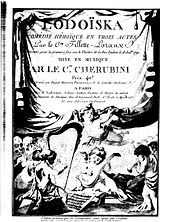Rescue opera
The rescue opera (also known as horror and liberation opera) describes a current of opera especially in the decade of the French Revolution (1789–1799). The French generic name comédie héroïque ("heroic comedy ") is less common in German. "Rescue operas " were premiered in Paris outside of the established opera houses, for example in the Théâtre Feydeau . Because Paris was the “opera capital”, they were widely used.
Characteristic
The rescue opera reflects the social insecurity during the turmoil of the revolution in the unfulfilled desire for freedom and justice. “Rescue from distress” in connection with a love story is the scheme of their actions, predominantly with historical or fairytale-like, more rarely with antique material.
The rescue opera is close to the popular melodrama of a pixérécourt and was therefore often rated negatively. But it had a reputation for being popular.
prehistory
The rescue opera developed mainly from the opéra-comique , for example from operas with adventure material such as Richard Cœur-de-Lion by André-Ernest-Modeste Grétry , 1784. Mozart's Die Entführung aus dem Serail (1782) is also occasionally mentioned as a predecessor .
The rescue opera has to do with the endeavors, after the dissolution of the aristocratic distinction between tragedy and comedy (“class clause ”), to obtain more current material for the opera stage and to attract a new audience.
Examples
Typical rescue operas are Henri Montan Berton's Les Rigueurs du Cloître (1790), Luigi Cherubini's Lodoïska (1791) and Les Deux journées ( The Water Carrier ) (1800) or Jean-François Lesueurs La Caverne (1793). These operas were originally not performed by the Paris Opera or the Opéra-Comique , but by the Parisian fairground theaters and boulevard theaters.
influence
With his opera Fidelio (1805), Beethoven attempted to write a rescue opera without any external tension , so as not to cover the ideal content with drama. Although rescue opera was very short-lived as a genre, its conception had an influence well into the 19th century, for example on Gioachino Rossini ( Torvaldo e Dorliska , 1815) and later on Giuseppe Verdi ( Nabucco , 1841).
literature
- Sieghart Döhring : The rescue opera. Music theater in the interplay of political and aesthetic processes. In: Helga Lühning, Sieghard Brandenburg (Hrsg.): Beethoven. Between revolution and restoration. Beethoven-Haus, Bonn 1989, ISBN 3-88188-001-1 , pp. 109-136.
